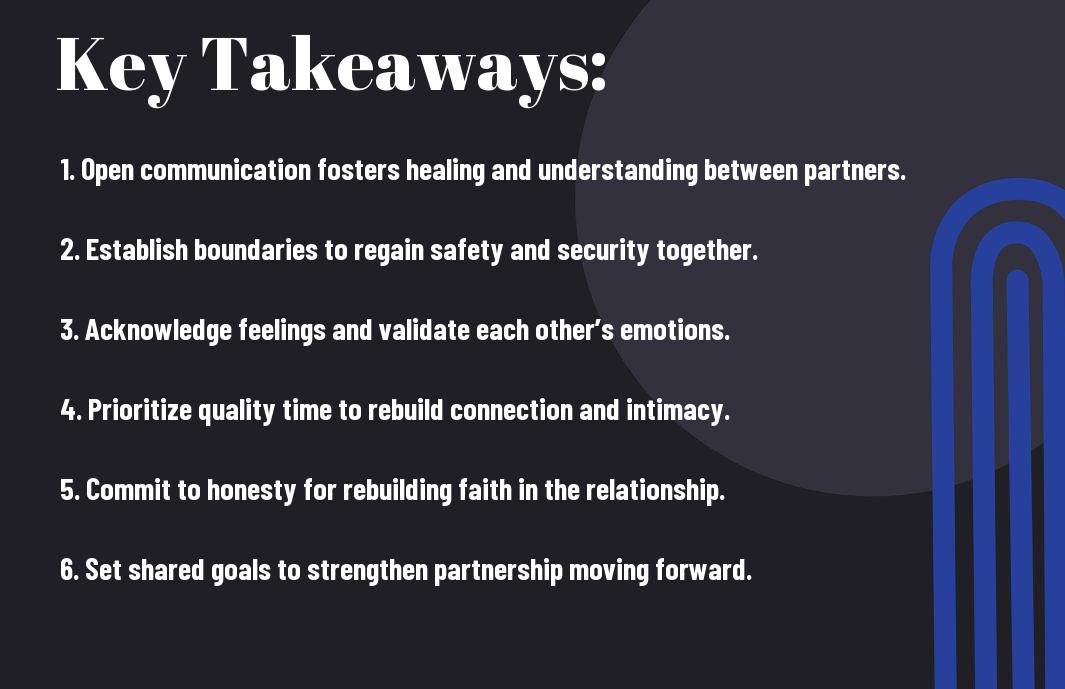Many couples face the aftermath of an emotional affair, grappling with deep feelings of betrayal and hurt. Rebuilding trust in your relationship is possible, and you can navigate this challenging journey without formal counseling. By focusing on open communication, acknowledging feelings, and establishing clear boundaries, you can foster a sense of security in your partnership. It’s imperative to actively engage in rebuilding your connection, as it can lead to a stronger bond than before. Let’s explore practical steps you can take to heal and regain trust in your relationship.
Key Takeaways:
- Open communication is crucial; both partners should express their feelings and concerns honestly.
- Establish boundaries to rebuild trust and ensure both partners feel safe in the relationship.
- Engage in consistent and proactive efforts to reconnect emotionally and physically.
- Identify triggers that may lead to feelings of insecurity and work together to address them.
- Practice forgiveness to move forward, allowing both partners to heal from the emotional pain.
- Create a shared vision of the future to foster commitment and mutual goals.
- Invest time and effort in activities that foster closeness and strengthen the bond between partners.


Understanding Emotional Affairs
For many individuals, emotional affairs can be just as damaging as physical ones. They often begin innocently, driven by the need for emotional connection or support outside your primary relationship. However, navigating the intricacies of these attachments can lead to a cascade of trust issues and emotional turmoil, significantly impacting both partners.
Definition and Characteristics
About emotional affairs, they involve an emotional bond with someone outside your committed relationship that can include deep conversations, shared secrets, or romantic feelings. Unlike physical affairs, the focus is on emotional intimacy, often leaving partners feeling neglected or betrayed. Recognizing these characteristics is the first step toward understanding the repercussions they might have on your relationship.
Impact on Relationships
Relationships can suffer significantly when an emotional affair comes to light. The sense of betrayal experienced by the wronged partner often leads to feelings of inadequacy and jealousy. Trust is inevitably shattered, making it difficult to restore the intimacy and connection that once existed. These emotional wounds demand careful attention and effort to heal, requiring both partners to openly communicate and work on rebuilding the bond.
Affairs can lead to profound shifts in your relationship dynamic. They create disconnection from your partner, generating an atmosphere of mistrust and lingering uncertainty. You may find yourself questioning your partner’s loyalty, leading to a breakdown in communication and emotional distance. However, with committed effort from both sides, it is possible to turn the situation around, focusing on healing and rebuilding trust to salvage your bond.
Recognizing the Need for Recovery
One of the first steps toward healing after an emotional affair is recognizing the need for recovery. Acknowledging the betrayal and its impact on your relationship is necessary for moving forward. It may be helpful to seek insights from those who have faced similar challenges, such as Rebuilding trust after an emotional affair : r/survivinginfidelity. Taking this step can be both daunting and liberating, as it marks the beginning of your journey toward trust and intimacy restoration.
Assessing the Relationship’s Health
Recovery starts with a thorough assessment of your relationship’s health. Examine the strength of your emotional bond, communication patterns, and levels of intimacy. Reflect on whether aspects of your partnership have changed since the affair and identify the underlying issues that may have contributed. Understanding these factors will help you better navigate the path to rebuilding trust.
Identifying Personal Feelings
The journey to recovery involves deep introspection and identifying your personal feelings regarding the affair. You need to acknowledge any lingering emotions, such as anger, sadness, or confusion, which can influence your healing process.
Health isn’t solely about the relationship; it also pertains to your emotional state. Recognizing your feelings, irrespective of how intense they may be, is paramount to your recovery. Assessing whether you feel betrayed, insecure, or even relieved can help you identify patterns and triggers. Ensure to validate your emotions without judgment and understand that it’s perfectly normal to experience a spectrum of feelings as you process this situation.
Open Communication Strategies
All imperative elements of emotional affair recovery hinge on open communication. Establishing a transparent dialogue with your partner allows for the expression of feelings, concerns, and needs. You must create an environment where both of you can openly share thoughts without fear of judgment or reprisal. This will not only foster understanding but also help rebuild broken trust.
How to Initiate Honest Conversations
At the start of any conversation, it’s important to approach your partner with empathy and a clear intention to understand. Frame your discussion with “I” statements to express how you feel and avoid placing blame. This can naturally encourage open dialogue and help both of you to feel more comfortable sharing sensitive thoughts.
Establishing Safe Spaces for Discussion
Between you and your partner, establishing safe spaces for discussion is vital for emotional affair recovery. Aim to choose a designated time and comfortable environment where both of you feel at ease to speak freely. Eliminating distractions is important; turn off your phones and choose a quiet place. This will help ensure that your discussions remain productive, allowing both of you to articulate feelings and concerns without interruptions. Hurdles and misunderstandings can be overcome when there is a shared commitment to honesty, making these safe spaces a cornerstone of your rebuilding process.
Even small efforts like weekly check-ins can create a consistent routine for open dialogue. By prioritizing these safe spaces, you foster a supportive atmosphere where both partners feel valued and heard, leading to deeper trust and understanding over time. The commitment to maintaining this environment will be key in navigating through difficult emotional discussions, allowing for healing and growth.

Rebuilding Trust: Step-by-Step
To effectively rebuild trust after an emotional affair, you must follow a structured approach. This process takes dedication and time, but with genuine effort, you can restore the foundation of your relationship. Below is a step-by-step guide to assist you in this journey:
| Step | Description |
|---|---|
| Acknowledgment | Recognize the impact of the affair on your relationship. |
| Accountability | Take responsibility for your actions and their consequences. |
| Making Amends | Offer sincere apologies and show commitment to change. |
| Setting Boundaries | Establish new rules to strengthen your relationship. |
Acknowledgment and Accountability
Around the recovery process, it is necessary to acknowledge the pain caused by the emotional affair. You need to face the reality of your choices and their effects on your partner. Taking responsibility is fundamental in showcasing your commitment to change. This phase involves honest discussions about feelings and the deep-rooted issues within your relationship.
Making Amends and Setting Boundaries
StepbyStep, you should focus on making amends and establishing clear boundaries. This not only demonstrates your willingness to change but also helps rebuild security in your relationship.
At this stage, it’s vital to offer a heartfelt apology to your partner, explaining your actions and the pain they caused. Setting boundaries requires open communication; discuss what behaviors are acceptable moving forward. By establishing these limits, you create a safe space for both of you. This will affirm your commitment to the relationship and allow for potential growth. Clarity in boundaries helps prevent misunderstandings and aids in rebuilding trust more effectively.
Emotional Healing for Both Partners
Now that you understand the depth of an emotional affair, it’s vital to focus on emotional healing for both you and your partner. This process involves acknowledging feelings, sharing vulnerabilities, and actively participating in rebuilding trust. By creating an environment that fosters open communication, you can both work through pain and gradually mend your bond, paving the way for a healthier relationship moving forward.
Self-Reflection and Personal Growth
By taking the time for self-reflection, you can gain valuable insights into your own emotional landscape and recognize patterns that may have contributed to the affair. This personal growth is necessary not only for healing individually but also for enhancing your relationship’s resilience in the future. Embracing accountability and fostering self-awareness will empower you to make meaningful changes.
Supporting Each Other Through the Process
Partners must take an active role in supporting one another during the healing journey. Open communication about feelings, triggers, and expectations can lay a solid foundation for trust restoration. Expressing empathy and validating each other’s emotions can cultivate a nurturing environment where both partners feel safe to share and heal together.
Other significant aspects of supporting each other include being patient and allowing space for your partner to process their emotions. Daily check-ins can foster deeper connections and show your commitment to one another. It’s also vital to avoid blame and instead focus on understanding each other’s experiences. By engaging in shared activities or discussing past joys, you can rekindle your emotional bond. The goal is to create a partnership where both of you feel valued, respected, and most importantly, trusted once again.
Creating a Stronger Partnership
Keep in mind that rebuilding trust after an emotional affair is an opportunity to enhance your partnership. Engaging in open communication and fostering a supportive atmosphere will set the stage for a stronger bond. As you both work to heal, focus on shared experiences and activities that bring you closer together, helping to reinforce your commitment to each other.
Reassessing Goals and Values
Among the first steps to strengthening your relationship is to openly reassess your goals and values together. This involves having candid conversations about what you both want from life and your partnership, whether it includes family planning, career aspirations, or personal growth. By aligning your visions, you lay a solid foundation for trust and mutual support.
Establishing New Relationship Practices
With a commitment to moving forward, you should establish new relationship practices that reinforce your bond. This may include regular check-ins where you discuss feelings, goals, and any concerns. These practices create a safer space for transparency and promote emotional intimacy, which is vital for fortifying your relationship.
Relationship practices play a significant role in maintaining and building trust after an emotional affair. Setting aside time each week to connect emotionally and discuss challenges openly helps both partners feel valued and understood. Additionally, implementing rituals such as date nights or shared hobbies can enhance your connection and remind you of the joy you share. As you establish consistent practices, this ongoing effort reinforces your commitment to each other, allowing your partnership to flourish in a healthier direction.
To wrap up
Considering all points, recovering from an emotional affair requires patience and dedication. You must actively engage in honest communication, set clear boundaries, and foster transparency in your relationship. By prioritizing your partner’s feelings and demonstrating commitment to rebuilding trust, you create a more resilient foundation for your connection. Focus on your shared goals and nurture your emotional intimacy, allowing both of you to heal and grow together without the need for external counseling. Ultimately, your efforts can lead to a stronger and more fulfilling relationship moving forward.
FAQ
Q: What are emotional affairs and how do they differ from physical affairs?
A: Emotional affairs typically involve a deep emotional connection with someone outside the committed relationship, often including intimacy, shared feelings, and personal exchanges. Unlike physical affairs, emotional affairs may not involve sexual encounters but can be equally damaging due to the emotional betrayal felt by the partner. Understanding this distinction is critical for those seeking to rebuild trust.
Q: Is it possible to recover from an emotional affair without professional counseling?
A: Yes, recovery from an emotional affair can occur without professional counseling. However, it requires dedication from both partners to openly communicate, take responsibility for their actions, and commit to rebuilding trust. Setting boundaries, honest discussions, and engaging in activities that foster connection can significantly contribute to healing the relationship.
Q: What steps can partners take to rebuild trust after an emotional affair?
A: Rebuilding trust after an emotional affair involves several steps:
1. Open Communication: Both partners should engage in honest dialogues about feelings, doubts, and expectations.
2. Acknowledge the Hurt: The partner who strayed must recognize the pain caused and show genuine remorse.
3. Establish Transparency: Implementing open sharing of emotions and daily activities can help rebuild trust.
4. Create a New Foundation: Both partners should work together to set new boundaries and goals for the relationship.
5. Invest Time: Spend quality time together to reconnect and strengthen the bond.
Q: How can a partner cope with feelings of betrayal during the recovery process?
A: Coping with feelings of betrayal involves acknowledging and processing those emotions. Practicing self-care, engaging in individual hobbies, and seeking support from friends or support groups can provide comfort. Journaling feelings or practicing mindfulness techniques can also help process emotions effectively. Communicating openly with the partner about feelings can foster mutual understanding and support during this time.
Q: What role does forgiveness play in recovering from an emotional affair?
A: Forgiveness is a vital part of the recovery process. It does not mean forgetting the betrayal or excusing the behavior but rather releasing the hold that the anger and hurt have on one’s emotional state. The process of forgiveness can lead to healing and allows both partners to move forward in the relationship. It often requires time, patience, and open discussions about feelings and concerns.
